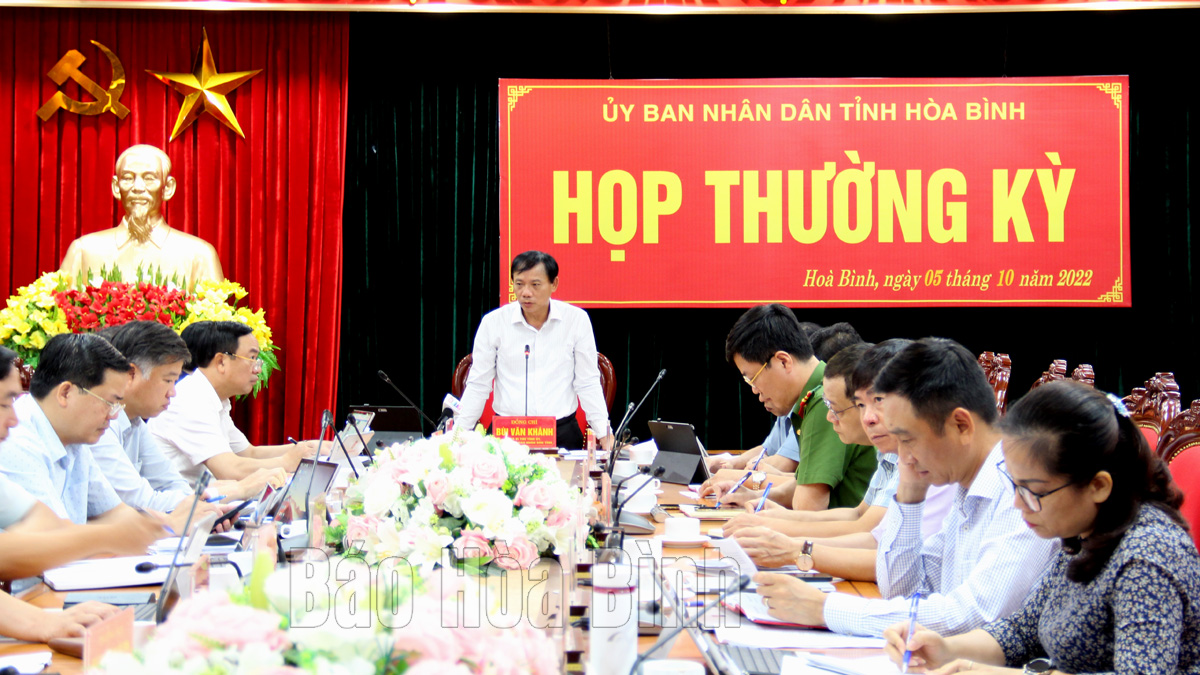
(HBO) – The Hoa Binh provincial People’s Committee held a monthly meeting for September on October 5 under the chair of Bui Van Khanh, Vice Secretary of the provincial Party Committee and Chairman of the provincial People’s Committee. The event assessed the implementation of tasks assigned by the provincial People’s Committee and its chairperson. It also discussed the documents to be submitted to the provincial Party Committee’s Standing Board and the provincial People’s Council, along with other contents serving management and governance activities of the People’s Committee.
Bui Van Khanh,
Vice Secretary of the provincial Party Committee and Chairman of the provincial
People’s Committee, addresses the meeting.
At the
event, officials looked into the State budget collection, public investment
disbursement, and progress of key projects in Hoa Binh. As of September 30,
almost 3.76 trillion VND (157.4 million USD) had been collected for the State
budget, equivalent to 96% of the target set by the Prime Minister and 59% of
that set by the provincial People’s Council. It increased 13% from the same
period last year.
Meanwhile,
though public investment disbursement was higher than the national average, it
still failed to meet requirements. By September 10, the province had disbursed
nearly 1.83 trillion VND of public capital, equivalent to 46% of the target set
by the Prime Minister and 38% of that set by the provincial People’s Committee.
Regarding
the progress of key projects, 11 projects are being carried out, including six
not funded with the provincial budget and five using public capital.
Participants
also gave opinions on 12 contents to be submitted to the provincial People’s
Committee.
Addressing
the meeting, Chairman of the Hoa Binh People’s Committee Bui Van Khanh stressed
that the fourth quarter is the time to sprint for socio-economic development
targets of 2022. Therefore, departments, sectors, and localities need to base
on the reality and closely follow the provincial administration’s directions to
examine and ramp up task performance.
He
requested focus be put on auctioning the land use right and managing land in
accordance with legal regulations, increasing management over mineral and
natural resource exploitation and the environment, and stringently deal with
violating businesses in line with laws.
In terms of
State budget revenue and public investment disbursement, the chairman asked for
continued focus on budget collection measures, including stepping up the
collection from land.
He also
demanded departments, sectors, and localities proactively examine the projects
started recently to ensure they are implemented in line with the approved
planning./.
Hoa Binh province is undergoing a dynamic transformation amid Vietnam’s national digital transition. Building on Poliburo’s Resolution No. 57-NQ/TW on breakthroughs in science, technology, innovation, and national digital transformation, the province has rolled out a wide range of practical action plans. A standout initiative is the "Digital Literacy for All” movement, an effort to ensure that no one is left behind in the digital era.
Hoa Binh province is undergoing a dynamic transformation in the wake of the national digital transformation movement. Building on Resolution No. 57-NQ/TW of the Politburo on breakthroughs in science, technology, innovation, and national digital transformation, the province has implemented a wide range of practical action plans. A standout initiative is the "Digital Literacy for All” movement ambitious effort to ensure that no one is left behind in the digital age.
With a spirit of unity and proactive problem-solving, the Party Committee, the government and the people of Dong Lai Commune (Tan Lac District) have made great strides in implementing the resolutions of the 24th Party Congress of the commune for the 2020 - 2025 term. Focusing on leadership and practical actions, the commune has brought the Party’s resolutions into daily life, creating strong impacts and pushing the local development forward.
Amid the nationwide push for digital transformation, young people in Hoa Binh Province are stepping up as dynamic pioneers, applying technology to enhance Youth Union operations and expand the reach of youth-led initiatives. Through creativity and adaptability, Youth Union organizations at all levels have introduced a series of practical solutions, contributing to modern governance and community development.
In recent years, An Nghia commune, located in Lac Son district, has stepped up administrative reform, focusing on improving the quality and efficiency of its single-window service unit for receiving and processing administrative procedures. These improvements have helped create favourable conditions for local residents and organisations to handle administrative procedures, contributing to the commune’s broader socio-economic development.
The Prime Minister-approved master plan to develop the multi-use value of forests ecosystems through 2030, with a vision to 2050, aims to improve the management and sustainable use of forest resources, create jobs, increase incomes, and improve the living standards of ethnic minorities, people in mountainous and remote areas, forest workers and those living near forests.



